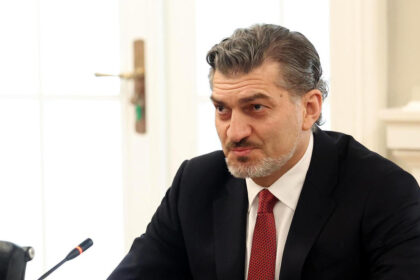**Georgia’s Protest Wave Continues: Demonstrators Demand Justice and Change**
On May 4, a large crowd of protesters took to the streets in the suburbs of Tbilisi, marking the 158th consecutive day of anti-government demonstrations in Georgia. The “March of Unity” was led by family members of those arrested during the protests and co-organized by various civic groups.
The demonstrators marched from Isani metro station to the Interior Ministry headquarters, which they dubbed the “Ministry of Dirty Affairs.” As they walked, they chanted slogans such as “Nation demands resignation!” and “We no longer trust the police uniform.” The protesters carried posters with photos of beaten activists, high-ranking police officials, and officers accused of giving false testimony against protesters.
The march was a powerful display of public discontent with the government’s handling of the protests. By targeting the Interior Ministry, demonstrators are highlighting systemic abuses and demanding justice for those who have been arrested or mistreated by law enforcement. The choice of location also sends a message: that the government is not above accountability and must be held responsible for its actions.
One notable aspect of this march was its daytime timing and movement into the subway system. Protesters entered metro trains at Varketili station, showing their determination to reach as many people as possible with their message. The march then continued on to Rustaveli Avenue, where protesters blocked the road in front of the parliament building.
The presence of families watching from windows and balconies, with some displaying national flags in support, suggests a growing sense of public engagement and solidarity with the protest movement. This grassroots momentum is crucial for the success of the protests and highlights the government’s failure to address the concerns of its citizens.
**A Systemic Problem**
The Interior Ministry has been at the center of controversy since the start of the anti-government protests in October 2023. Critics argue that the ministry has used excessive force, arrested peaceful protesters, and fabricated charges against demonstrators. The high-profile arrests of prominent activists and journalists have further polarized society.
By targeting the Interior Ministry, protesters are highlighting systemic abuses within the institution. The demand for resignation is not just a call to remove individuals; it’s also a push for reform and accountability within the ministry. This requires a broader understanding that the problem lies not just with individual officials but with the system itself.
**The Way Forward**
As the protest wave continues, one question remains: what next? The government has shown little willingness to address the concerns of protesters or make meaningful reforms. If the protests are to be sustained, they will need to maintain public support and demonstrate tangible progress towards justice and reform.
For now, the “March of Unity” serves as a powerful reminder that Georgia’s people demand change and will not back down until their voices are heard and their demands met. The international community is watching closely; how the government responds will be crucial in shaping the country’s future.












